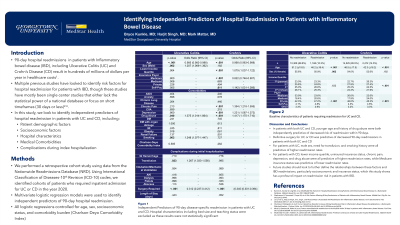Tuesday Poster Session
Category: IBD
P3569 - Identifying Independent Predictors of Hospital Readmission in Patients With Inflammatory Bowel Disease
Tuesday, October 24, 2023
10:30 AM - 4:00 PM PT
Location: Exhibit Hall

Has Audio

Bryce Kunkle, MD
MedStar Georgetown University Hospital
Washington, DC
Presenting Author(s)
Bryce Kunkle, MD, Harjit Singh, MD, Mark Mattar, MD
MedStar Georgetown University Hospital, Washington, DC
Introduction: 90-day hospital readmission in patients with inflammatory bowel disease (IBD) results in hundreds of millions of dollars per year in healthcare costs. In this study, we look to identify independent risk factors for readmission in patients admitted with a primary diagnosis of Ulcerative Colitis (UC) or Crohn’s Disease (CD).
Methods: We performed a retrospective cohort study using data from the Nationwide Readmissions Database (NRD). Using International Classification of Diseases-10th Revision (ICD-10) codes, we identified cohorts of patients who required inpatient admission for UC or CD in the year 2020. Multivariate logistic regression models were used to identify independent predictors of 90-day hospital readmission, including demographic, socio-economic, and hospital characteristics, as well as medical comorbidities and complications during the index hospitalization.
Results: A total of 28,473 patients were identified who required hospitalization for UC (n=11,476) and CD (n=16,997), with an overall rate of IBD-specific readmission of 12.8% and a total of $186.5 million in healthcare costs. In patients with UC, younger age (Odds ratio 0.99, 95% confidence-interval 0.98-0.99), male sex (OR 1.21, 1.07-1.36), active drug abuse (OR 1.38, 1.01-1.86), active tobacco use (OR 1.25, 1.08-1.48), and transfusion requirement during hospitalizations (OR 1.27, 1.03-1.56) were all independently predictive of increased 90-day readmission (all p < .05). In patients with CD, younger age (OR 0.968, 0.98-0.99), lower income quartile (OR 1.08, 1.04-1.12), Self-pay insurance status (OR 1.14, 1.03-1.27), chronic pain (OR 1.39, 1.22-1.60), depression (OR 1.22, 1.09-1.37), and active drug abuse (OR 1.42, 1.18-1.71) were all independently predictive of increased 90-day readmission. Abdominal surgery performed during the index hospitalization was predictive of decreased 90-day readmissions for patients with both UC and CD (both p < .05).
Discussion: 90-day readmission occurs frequently in patients with IBD and is costly to the healthcare system. This study identifies several potentially modifiable risk factors for readmission, many of which are based in substance use, socio-economic status, and insurance status. Further studies are needed to clarify the impact of these factors on the disease burden of IBD, particularly regarding socioeconomic status.
Disclosures:
Bryce Kunkle, MD, Harjit Singh, MD, Mark Mattar, MD. P3569 - Identifying Independent Predictors of Hospital Readmission in Patients With Inflammatory Bowel Disease, ACG 2023 Annual Scientific Meeting Abstracts. Vancouver, BC, Canada: American College of Gastroenterology.
MedStar Georgetown University Hospital, Washington, DC
Introduction: 90-day hospital readmission in patients with inflammatory bowel disease (IBD) results in hundreds of millions of dollars per year in healthcare costs. In this study, we look to identify independent risk factors for readmission in patients admitted with a primary diagnosis of Ulcerative Colitis (UC) or Crohn’s Disease (CD).
Methods: We performed a retrospective cohort study using data from the Nationwide Readmissions Database (NRD). Using International Classification of Diseases-10th Revision (ICD-10) codes, we identified cohorts of patients who required inpatient admission for UC or CD in the year 2020. Multivariate logistic regression models were used to identify independent predictors of 90-day hospital readmission, including demographic, socio-economic, and hospital characteristics, as well as medical comorbidities and complications during the index hospitalization.
Results: A total of 28,473 patients were identified who required hospitalization for UC (n=11,476) and CD (n=16,997), with an overall rate of IBD-specific readmission of 12.8% and a total of $186.5 million in healthcare costs. In patients with UC, younger age (Odds ratio 0.99, 95% confidence-interval 0.98-0.99), male sex (OR 1.21, 1.07-1.36), active drug abuse (OR 1.38, 1.01-1.86), active tobacco use (OR 1.25, 1.08-1.48), and transfusion requirement during hospitalizations (OR 1.27, 1.03-1.56) were all independently predictive of increased 90-day readmission (all p < .05). In patients with CD, younger age (OR 0.968, 0.98-0.99), lower income quartile (OR 1.08, 1.04-1.12), Self-pay insurance status (OR 1.14, 1.03-1.27), chronic pain (OR 1.39, 1.22-1.60), depression (OR 1.22, 1.09-1.37), and active drug abuse (OR 1.42, 1.18-1.71) were all independently predictive of increased 90-day readmission. Abdominal surgery performed during the index hospitalization was predictive of decreased 90-day readmissions for patients with both UC and CD (both p < .05).
Discussion: 90-day readmission occurs frequently in patients with IBD and is costly to the healthcare system. This study identifies several potentially modifiable risk factors for readmission, many of which are based in substance use, socio-economic status, and insurance status. Further studies are needed to clarify the impact of these factors on the disease burden of IBD, particularly regarding socioeconomic status.
Disclosures:
Bryce Kunkle indicated no relevant financial relationships.
Harjit Singh indicated no relevant financial relationships.
Mark Mattar indicated no relevant financial relationships.
Bryce Kunkle, MD, Harjit Singh, MD, Mark Mattar, MD. P3569 - Identifying Independent Predictors of Hospital Readmission in Patients With Inflammatory Bowel Disease, ACG 2023 Annual Scientific Meeting Abstracts. Vancouver, BC, Canada: American College of Gastroenterology.
